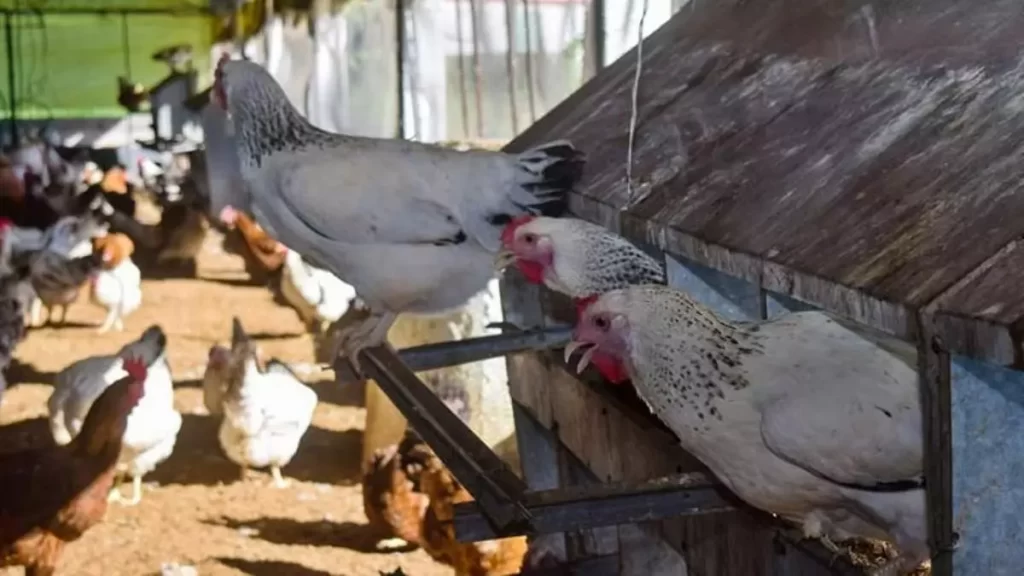Egg production in Cuba has decreased from five million units a day in 2020 to 2.2 million in 2023

![]() 14ymedio, Miguel García, Havana, 10 June 2024 — At least 54,000 laying hens are being slaughtered in Holguín, a process that has begun due to the impossibility of keeping them due to the lack of animal feed. According to 14ymedio, the process started several weeks ago but had to be suspended when the production line of the slaughterhouse, located in San Rafael Adentro at kilometer 5 and a half on the road to Mayarí, broke down. However, the damaged parts have already been replaced and the plan has been resumed.
14ymedio, Miguel García, Havana, 10 June 2024 — At least 54,000 laying hens are being slaughtered in Holguín, a process that has begun due to the impossibility of keeping them due to the lack of animal feed. According to 14ymedio, the process started several weeks ago but had to be suspended when the production line of the slaughterhouse, located in San Rafael Adentro at kilometer 5 and a half on the road to Mayarí, broke down. However, the damaged parts have already been replaced and the plan has been resumed.
“They slaughter them because, according to the management of the Poultry Company of the province (Avihol), there is no food in Holguín,” said a source linked to the company who fears the situation will go further. “And if this is the case here, it may be the same in the rest of the country,” he speculates. The most serious thing, according to the same source, “is that there is no replacement, that is, they are slaughtering them without having spare hens.”
In just three years, Avihol has gotten into a catastrophic situation. The company not only surpassed egg production and supplied the province, but also served Santiago de Cuba and Las Tunas, earning the praise of former First Vice President José Ramón Machado Ventura in February 2020. At the end of that same year, a report in the pro-government newspaper Ahora recalled that this was the second largest in the country, being part of the National Program for producing five kilograms of protein per capita, including poultry. At that time, it produced about 426,000 eggs a day and 152.6 million eggs in a year.
In just three years, Avihol has gotten into a catastrophic situation.
However, everything changed after the pandemic. In May 2023, Jorge Romero Marrero, director of the company, had to admit that the emergency required urgent measures. “The current financial situation does not allow us to acquire resources for the maintenance of the conditions that the sections require, and many units have deteriorated, which negatively impacts this line of production,” he said.
The manager said that the reduction in the feed had reduced the poultry population and decimated the hens, which in turn reduced the production of eggs. The price became completely unsustainable, which affected the workers’ wages. In fact, according to the source of this newspaper, the company was immersed in what the government jargon calls “availability process,” a euphemism to avoid the word “layoff,” only happening in its basic units, not in the headquarters.
Romero Marrero said that, despite the threat that was looming at that time on the company’s economy due to the low prices of eggs in the non-rationed market, there was a commitment to guarantee the rationed seven eggs per person and raise the price to the non-rationed commercialization carried out on weekends. In this case, the egg would be sold at 15 pesos, leaving the company’s profit at only 80 cents, but which would allow it, they believed, to sustain production.
Currently, the egg allowance on the ration book in the province has been reduced to five eggs per person per month.
The reality has been different and, currently, the number of eggs on the ration book in the province has been reduced to five eggs per person per month.
Chicken egg production, like so many other food sources, has plummeted in the country, which must resort to imports to meet demand. Just three days ago, the government press announced that Colombia would send about 40 million eggs to the island before the end of the year. As of today, 33 million units are still to come to comply with the agreement, since the first seven million arrived in Cuba in March. In May, the authorization was also granted for three companies from the Dominican Republic to export eggs to the island, in addition to other poultry products including meat and meat-based products.
Information about the pitiful state of the birds has multiplied in recent years and the causes are not only the price of animal feed. The lack of water and the blackouts, which interrupt the normal operation of the facilities thus harming the health of the hens, are also part of the problem. In November 2023, the Minister of Agriculture, Ydael Pérez Brito, reported that the production of eggs in Cuba has decreased from five million a day in 2020 to 2.2 million in 2023.
Translated by LAR
____________
COLLABORATE WITH OUR WORK: The 14ymedio team is committed to practicing serious journalism that reflects Cuba’s reality in all its depth. Thank you for joining us on this long journey. We invite you to continue supporting us by becoming a member of 14ymedio now. Together we can continue transforming journalism in Cuba.
